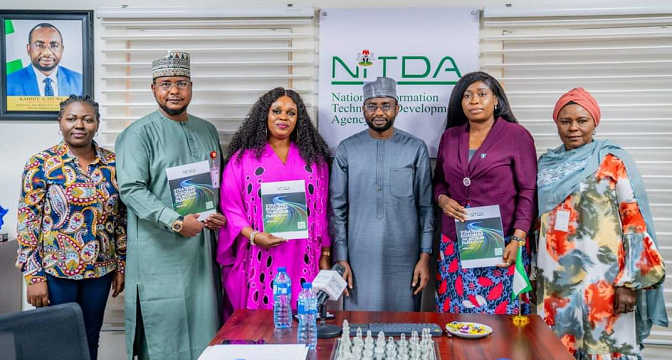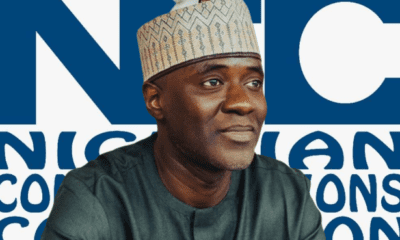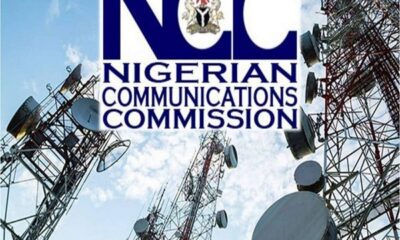Infotech
NCC’s regulatory excellence in telecoms sector powers Nigeria’s economy at 63
The Nigerian Communications Commission (NCC) has played a crucial role in driving the growth and development of Nigeria’s economy over the past 63 years.
With its commitment to regulatory excellence in the telecoms sector, the NCC has created an enabling environment for innovation, investment, and competition, leading to increased connectivity, job creation, and economic empowerment.
In today’s digital age, the telecommunications sector plays a crucial role in driving economic growth and development.
In Nigeria, the NCC has emerged as a key player in ensuring regulatory excellence, fostering innovation, and powering the country’s economy.
The NCC has established itself as a beacon of regulatory excellence, creating an enabling environment for telecom operators to thrive while safeguarding the interests of consumers.
Through the implementation of transparent policies, the NCC has attracted significant investments in the sector, leading to improved infrastructure, increased connectivity, and enhanced service quality.
Recognising the importance of competition and innovation in driving economic growth, the NCC has implemented various measures to foster a competitive telecoms market.
By promoting fair competition, the NCC has encouraged telecom operators to invest in new technologies, expand their networks, and offer innovative services to consumers. This has not only resulted in improved connectivity but has also created job opportunities and stimulated economic activities across various sectors.
Access to affordable and reliable broadband internet is crucial for economic development in the digital age. The NCC has been at the forefront of efforts to expand broadband access in Nigeria.
Through its Broadband Implementation Plan, the NCC has set ambitious targets to increase broadband penetration, especially in underserved areas. By collaborating with telecom operators, the NCC has facilitated the deployment of broadband infrastructure, bridging the digital divide and empowering businesses and individuals with access to information and opportunities.
The NCC has developed and implemented policies that encourage the deployment and expansion of broadband infrastructure across the country. These policies provide guidelines and incentives for telecom operators to invest in broadband networks. The NCC is responsible for issuing licenses to telecom operators for the provision of broadband services
The NCC places a strong emphasis on consumer protection, ensuring that telecom services are affordable, reliable, and of high quality.
The telecommunications network infrastructure, including cables, satellites, cellular towers, and base transceiver stations (BTS), plays a crucial role in maintaining societal stability worldwide.
However, the protection of these critical infrastructures and their supporting structures has become increasingly challenging for both public and private organisations.
The interdependency of these infrastructures makes it essential to prioritise their protection. In Nigeria, there has been a significant increase in the vandalism of telecoms infrastructure, which has prompted the urgent need for concerted efforts to protect them.
According to telecom operators, the rate of vandalism is estimated to be over 45 percent annually.
Data from the Nigerian Communications Commission (NCC) reveals that the sector has experienced over 33,000 cases of vandalism and theft of facilities in a single year.
While these attacks occur across all six geo-political zones of the country, they are particularly prevalent in the SouthEast region. The surge in attacks has led the NCC to appeal to consumers of telecoms services to actively participate in protecting communication infrastructure in their respective areas.
The Commission has implemented various initiatives to address consumer grievances, such as the establishment of a toll-free helpline and the introduction of the Do-Not-Disturb (DND) service to combat unsolicited messages. By safeguarding consumer rights, the NCC has instilled confidence in the telecoms sector, attracting more users and driving economic growth.
The NCC’s commitment to regulatory excellence has not gone unnoticed by international investors. Nigeria’s telecoms sector has witnessed a significant influx of foreign direct investment (FDI) in recent years, thanks to the NCC’s transparent and investor-friendly policies.
This influx of FDI has not only boosted the telecoms sector but has also had a positive spillover effect on other sectors of the economy, creating employment opportunities and driving overall economic growth.
As Nigeria continues to embrace the digital revolution, the NCC’s unwavering commitment to regulatory excellence will undoubtedly continue to drive economic growth and development in the country.
According to the Commission, the broadband plan is designed to deliver data download speeds across Nigeria, a minimum of 25Mbps in urban areas, and 10Mbps in rural areas.
It also targets effective coverage for at least 90percent of the Nigerian population by 2025 at a price not more than N390 per 1GB of data.
Telecoms, as an enabler for other sectors of the economy, is highly capital-intensive.
“Yes, we have recorded major milestones in our telecoms sector. But are we satisfied as a Regulator? The answer is ‘No.’ This is because we still face inadequate infrastructure. Consequently, the NCC had identified 220 clusters of access gaps in the country and the real challenge behind connecting this large population of about 40 million is infrastructure deficit.
“This informs why the NCC evolved the InfraCo project with Public Private Partnership component embedded in it. In a recent update study carried out in 2019, the number of people living in the unserved and underserved areas was estimated to have dropped to 31.16 million and number of clusters reviewed down to 114.
Meanwhile, the NCC Executive Vice Chairman, Prof. Umar Garba Danbatta has assured that the Commission is committed to providing the enabling environment to attract the needed investment to expand 5G deployment while ensuring efficiency of existing technologies from 2G, to 3G and 4G towards providing the needed consistent digital impetus to the realisation of the Renewed Hope Agenda of President Bola Ahmed Tinubu.
Revenue generation and the sale of spectrums play a crucial role in the telecommunications industry. Spectrums refer to the range of electromagnetic frequencies that are used for wireless communication. These spectrums are a limited resource and are allocated by governments to various telecom operators through auctions or licensing processes.
The revenue generated from the sale of spectrums is a significant source of income for governments and telecom operators alike.
One of the primary ways governments generate revenue from spectrums is through spectrum auctions. In these auctions, the government offers a certain amount of spectrum for sale to interested telecom operators. The operators bid for the available spectrum, and the highest bidder wins the rights to use that spectrum for a specified period.
Similarly, in line with the Commission’s resolve to deepen knowledge and utilization of digital tools, the Commission has also been involved in trainings for officials in the Nigerian public sector.
One of such trainings was held for the Nigerian Judiciary being a very critical and indispensable arm of government
Speaking on the importance of the workshop, Danbatta noted that the telecommunications sector has evolved since the NCA 2003 came into existence hence the need to be responsive in readiness to keep pace with the dynamics of technologies that will come.
The EVC noted that the workshop afforded the Commission ample opportunity to engage the Judiciary on how to adopt digital technologies in advancing the course of justice.
He said, “The communications sector, through infrastructure deployment, has continually ensured that the digital economy agenda of the Federal Government is established on a solid foundation. It has also proven to be the catalyst for entrenching the activities of both the public and private sectors in the digital space, seamlessly.
“However, we recognise that in any digital economy, the development of a complex web of commercial transactions and social interactions is inevitable. Thus, to instill societal confidence in the digital economy, at least, two things are required: a safe and effective backbone infrastructure, as well as an efficient adjudicatory mechanism, which is easily accessible in the digital space,” he stated.
The EVC said this reality informs the NCC’s steadfast partnership with the NJI to develop capacity for judges in this area, saying this would ensure that the Court, being the last hope of the common man, is firmly woven into the fabric of the digital economy.
In terms of developing local content, the Commission has over the years organized a fora to promote Indigenous innovation and technologies. The Nigerian Telecommunications Indigenous Content Expo (NTICE) is being coordinated by NCC’s Nigeria Office for Developing the Indigenous Telecom Sector (NODITS), which superintends over efforts for effective implementation of the National Policy on the Promotion and Implementation of Indigenous Contents in the Telecommunications Sector, (NPPIC).
The event has continued to serve as a rare assemblage of stakeholders where diverse thoughts can be shared in contexts that advance utilisation of indigenous contents in the nation’s telecommunications industry.
As part of the developmental engagements by the NCC, a major milestone has been achieved, particularly in the security and economic sector, through the introduction of the toll-free 3 digits Emergency code, 112.
The Emergency Communication Centre, (ECC), has not only provided job opportunities for Nigerian youths and professionals, it has also solidified the security arm of the country. Moreso, with the agency’s incorporation of the Nigerian Police Force and other security arms, through the Computer-Aided Dispatch (CAD) systems.
Just by dialing the easy to remember code of 112, one can quickly report Emergency cases that would be responded to swiftly, such as armed robbery attack, theft, harassment and abuse and all emergency situations that poses as threat to citizens.
The Emergency Centres functions 24 hours of the day, seven days of the week. And the agents/workers are properly trained and fully equipped with ‘state-of-the-art communications equipment, including digital radio and Internet-protocol (IP) and geo-location technologies to enable quick responses and easy location of Emergency scene. This would reduce crime rates in the country if properly utilised.
The Emergency Communication Commission (ECC) has also become the channel for massive job opportunities and economic growth of the country.
To this effect, the NCC has recruited and equipped qualified individuals with adequate skills and training.
This development is a bold step to the reassurance of safety for both individuals and businesses across the nation and will in turn attract investments and business activities across the country as it also creates multiple job openings for citizens.
The Commission aims to have the ECC present in all 36 states before the end of the year.
Infotech
GITEX rallies stakeholders for 2nd African edition


The organisers of GITEX are set to rally stakeholders for the 2nd edition of GITEX AFRICA on topics poised to position Africa as a leader in digital transformation.
The 2nd edition of GITEX AFRICA, from 29-31 May 2024 in the vibrant city of Marrakech, shall converge global leaders and experts, governments, businesses, big tech, start-ups, investors, and academia from 130 countries to catalyse partnerships and advance the future ambitions of a continent determined to elevate its entrepreneurial innovation economy.
Under the High Patronage of His Majesty King Mohammed VI of the Kingdom of Morocco, May God Assist Him, GITEX AFRICA is held under the authority of the Moroccan Ministry of Digital Transition and Administration Reform in partnership with the Digital Development Agency (ADD).
Africa’s blockbuster tech showpiece event is organised by KAOUN International, the overseas affiliate of Dubai World Trade Centre (DWTC), which organises GITEX GLOBAL in the UAE, the world’s largest and most trusted tech and start-up event.
With the final preparations underway for a purpose-built mega venue in the heart of Marrakech, GITEX AFRICA 2024 will span 21 halls featuring 1,400 international exhibiting companies – a 70 percent year-on-year increase over the event’s record-breaking debut 2023.
This is the year of the AI phenomenon and its tantalising all-purpose capabilities to transform diverse sectors, from cybersecurity, cloud and IoT, to finance, telecoms, agriculture, and education, amplifying hopes of greater prosperity in the world’s second most populous continent. AI’s impact on health tech has also spurred the launch of World Future Health Africa, accelerating the continent’s ascending digital health revolution.
More than 700 of the most outstanding global start-ups from 45 countries, including 200 Moroccan start-ups, will also feature at GITEX AFRICA’s North Star Africa start-up showcase, turbo-charging a great investment revival in a resilient and vibrant start-up ecosystem that is estimated to raise US$10 billion in VC funds by 2025.
These award-winning game-changers will connect with 350 investors from 35 countries with US$200 billion worth of assets under management. Now the vital barometer of tech’s massive cross-continental advances, GITEX AFRICA 2024 shall unify the global tech community’s commitment to accelerate a responsible future in the world’s burgeoning Silicon Valley.
Addressing media at the show’s official preview press conference last week Wednesday, H.E Dr Ghita Mezzour, Minister of the Moroccan Ministry of Digital Transition and Administration Reform; Sidi Mohammed Drissi Melyani, the General Director of ADD; and Trixie LohMirmand, CEO of organiser KAOUN International.
In attendance were GITEX AFRICA’s official institutional partners: the ANRT (Moroccan National Telecommunications Regulatory Agency), ONDA (National Airports Office), OCP, Royal Air Maroc, ONCF (Moroccan National Railway Office), and the General Confederation of Moroccan Enterprises (CGEM).
Moroccan Minister of Digital Transition and Administration Reform, Ms. Ghita Mezzour, said, “The second edition of GITEX AFRICA Morocco falls within the framework of the unwavering efforts made by our country in the field of digital transition, in alignment with the Royal Directives of His Majesty King Mohammed VI, May God Assist Him, who stressed on the importance to optimally leverage the enormous development opportunities digital transition provides for African countries,” adding, “This edition will further consolidate Morocco’s position as a regional digital hub, thus creating an environment conducive to attracting more investments and stimulating job creation.”
Mr. Sidi Mohammed Drissi Melyani said, “This 2nd edition of GITEX AFRICA Morocco is even more ambitious and inclusive, as it responds first and foremost to the enthusiasm it has aroused around the world, and in more ways than one has affirmed Morocco’s positioning as a key hub in the world of technological innovation and the attractiveness of foreign investment in the promising digital sector. This year, just as many themes and sector niches will be highlighted, such as AI, reflecting the growing interest in the new global professions of technological innovation.”
Igniting talent development, catalysing a Pan-African tech rush
AI’s existential prospects and ability to leap-frog traditional barriers of economic development in Africa will dominate discussions at GITEX AFRICA 2024, catalysing a trans-continental tech rush across diverse industries, from cloud and IOT, cybersecurity, digital health, and future finance, to consumer tech, digital cities, and telecoms.
Tech leaders estimate the AI boom will add US$1.2 trillion to Africa’s economy by 2030, boosting the continent’s GDP by 5.6 percent, and accelerating the need for urgent digital discourses to deploy the shape shifting tech that is both sustainable and ethical.
CEO of KAOUN International, Trixie LohMirmand, said, “The recent developments in AI have created new opportunities and impetus for Africa in its digital transformation mission.
“Hosted in a continent adept at leapfrogging in critical industries, GITEX AFRICA Morocco presents governments, business leaders and talents with unparalleled access to new information and expert knowledge, and big opportunities in digital convergence. This shall empower them to co-create new strategies and solutions for the betterment of society.”
Government ministers, digital visionaries tackle Africa’s pressing tech challenges
Africa’s most progressive leadership conference programme will meanwhile gather 450-plus speakers from 70 countries, to debate, scrutinise, and tackle the greatest tech challenges and opportunities in the world’s second largest continent with bold ambitions to co-create and define its own Pan-African digital roadmap.
The GITEX AFRICA Digital Summit returns, leading ten conference stages comprising 280-plus hours of mind-stretching content advancing Africa’s digital movement. Impactful agendas will explore government policy and regulation, connectivity, digital cities and future finance, cybersecurity and health tech’s transformative opportunity, along with fast-tracking the world’s most exciting start-up ecosystem and challenging the realities of AI mania.
GITEX AFRICA 2024 is open from 10:00am to 6:00pm. Admission is for pre-registered trade professionals only with a special invitation for students aged 16 years and older on day three.
Infotech
NITDA to intensify digital transformation campaign to grassroots


The National Information Technology Development Agency (NITDA) has revealed plans to intensify its campaign in taking the benefits of digital technology to all the local governments across the country.
This was disclosed by the NITDA Director General, Kashifu Inuwa when he played host to the Senior Special Advisers to President on Community Engagement – South East, Barr Chioma Nweze; South West, Ms Moremi Ojudu and North West, Hon. Abdallah Tanko Yakassai who visited the Agency to discuss possible areas of collaboration on Nigeria’s digital transformation journey.
This gesture is in total alignment with the present administration’s priority areas, particularly in the area of reforming the economy for sustained inclusive growth.
While stating the agency’s vision for Nigeria where inclusive economic growth is fostered through technological innovation, the NITDA DG noted that the vision aligned with the president’s eight priority areas.
“The President wants to Reform the Economy to Deliver Sustained Economic Growth; Strengthen National Security for Peace and Prosperity; Boost Agriculture to Achieve Food Security; Boost Infrastructure and Transportation as Enablers of Growth; Focus on Education, Health and Social Investment as Enablers of Development; Accelerate Diversification through Digitisation, Industrialisation, Creative Art and Innovation; and Improve Governance for Effective Service Delivery to Citizens,” he said.
He added that the agency recently crafted its Strategic Roadmap and Action Plan (SRAP 2.0) 2024-2027, and its pillars are the tool that will help Mr President in delivering on all the presidential priority areas.
Enumerating the eight pillars of the SRAP, Inuwa highlighted “Foster Digital Literacy and Cultivate Talents” as one of the most important pillars the document is anchored on where inclusivity is pronounced.
“To ensure we are inclusive, we need to get our citizens to be digitally literate, so we developed the National Digital Literacy Framework with an ambitious target of achieving 95 percent digital literacy by 2030 but Mr President cited a mid-term target for us to achieve 70 percent by 2027,” he stated.
He further said that the agency is collaborating with the Ministry of Education in infusing digital literacy into all academic institution’s curricula while at the same time developing standard training with certifications that would be a prerequisite for securing government employment.
“We have already worked with the Head of Service to put it as a requirement for government workers to be digitally literate. But for the market people, artisans and so on, what they need is the literacy to use digital devices to access internet banking, government digital services and others. We have therefore been exploiting many channels to deliver them through TV programmes, social media, radio, roadshows and so on,” he averred.
The NITDA Boss stated that the 3 Million Tech Talent programme was another initiative of the Ministry of Communications, Innovation and Digital Economy in collaboration with the agency to identify skill gaps in the country and build youth’s capacity on skills in high demand locally and internationally.
“We have started the training and so far we have trained over 30,000 and completed the first phase which is a pilot. We are now executing the second phase of the training,” he said.
While giving deep insight into the other seven strategic pillars of Building a Robust Technology Research Ecosystem; Strengthening Policy Implementation and Legal Framework; Promoting Inclusive Access to Digital Infrastructure and Services; Strengthening Cybersecurity and Enhance Digital Trust; Nurturing an Innovative and Entrepreneurial Ecosystem; Forging Strategic Partnerships and collaborations and lastly, Cultivating a Vibrant Organisational Culture and an Agile Workforce in NITDA, Inuwa shared the various infrastructures, innovative solutions, sponsorships and training programmes the government has been offering nationwide.
In his remark, Hon. Yakassai appreciated the DG NITDA for his wonderful presentation by sharing insights into the various activities of the agency to ensure a digitally empowered nation by building the digital capacities of Nigerians.
He, however, expressed his team’s willingness to collaborate with the agency in the areas of propagating the agency’s activities to the grassroots throughout the 774 local governments in the country.
“Mr President is a grassroots person that is why he created this office so that we make sure whatever the government is doing is taken down to the grassroots level and we need to show the people the importance of your programmes and how they can key into it,” he stated.
Infotech
Glo urges school girls to aim for leadership


Globacom has urged school girls across the country to aspire to leadership positions without fear, despite the various challenges that they may face along the way.
Speaking at the commemoration of the 2024 edition of Girls in ICT Day held in Lagos on Thursday, Globacom’s representative, Mrs Kemi Fadipe, encouraged school girls to pursue their dreams with passion so that they can attain leadership positions in future.
She advised them to prioritise their education to lay a strong foundation for leadership roles and also seek mentorship and guidance from successful women, as well as build a network of supportive peers, teachers, family members, and mentors who believe in their potential.
She also advised them not to shy away from volunteering for leadership roles in projects, clubs, or community initiatives. “Taking on responsibilities demonstrates initiative, builds confidence, and showcases leadership potential,” she said, adding that “they should also step out of their comfort zones, embrace new experiences, and view setbacks as opportunities for growth and learning.”
“Today, in an era defined by rapid technological advancements and innovation, encouraging girls to pursue STEM education (Science, Technology Engineering and Mathematics) is not only essential for their individual development but also crucial for fostering gender equality and driving societal progress,” she noted.
She added that “STEM education fosters a lifelong passion for learning and a growth mindset—a belief that intelligence and abilities can be developed through dedication and hard work. Fantastic leaders continuously seek knowledge, adapt to change, and inspire continuous improvement.”
Citing several examples of women with STEM backgrounds who have attained positions both in Nigeria and beyond, Mrs Fadipe observed that their exceptional leadership skills, resilience, and dedication have made them “serve as inspiring role models for future generations of female leaders in Africa and beyond.”
The event had in attendance secondary school students from selected schools in Lagos and Ogun states.
-
Finance4 months ago
Court orders Sen. Victor Umeh to repay N136m bank debt to AMCON
-



 Abuja Update3 months ago
Abuja Update3 months agoUNDP, FG partnership needed to achieve inclusion, equity- Minister
-
Abuja Update2 months ago
Banks drive stock market performance with N147bn gain
-
capital market2 years ago
Rt.briscoe, FBNH, Others halts negative performance of stock market
-
Submission Guidelines5 months ago
CALL FOR SUBMISSIONS: POETRY COLUMN-NND
-



 Health1 month ago
Health1 month agoCapacity training will reduce migration of health workers- NPHCDA
-



 Business4 weeks ago
Business4 weeks agoTingo Group unveils Tingo Electric, Tingo Cola drink at Lagos launch
-
News5 months ago
Oil thieves sponsoring malicious media campaign against Navy – Spokesman














